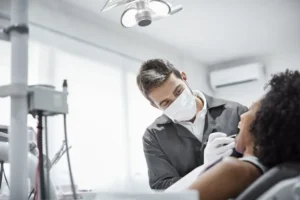Do you need an oral pathology screening?

A professional oral pathology screening can diagnose conditions early, allowing for easier treatment options and a much higher success rate. While your dentist and oral surgeon will provide routine checks, it’s a good idea to schedule an oral pathology screening appointment when potential signs of oral cancer are present.
Areas of the oral cavity to keep an eye on
Doing a quick self-check for problem signs is easy and something you should try to do every month. Be sure to inspect every part of your oral cavity for obvious changes, including your gums, tongue, the inside of your lips and cheeks, the roof of your mouth and your throat, tonsils and soft palate.
Things to look for
It’s a good idea to schedule an oral pathology screening if you notice any of these symptoms in any of the areas listed above:
- There are sores in your mouth that won’t heal
- Numbness in your lips or anywhere inside your oral cavity
- White, red or discolored patches
- Lumps or tissue that feels thick or rough in spots
- Lesions that open and bleed when you touch them
- Persistent soreness in the throat or a hoarse voice that won’t go away
- If you always feel like there’s something stuck in your throat
Don’t panic, just call
Just because you are experiencing one or more of the above signs does not mean that you have oral cancer. Many of these signs can also be the symptom of a reaction to medication or caused by other medical conditions, such as cold sores, canker sores, or a benign tumor or cyst. Only your doctor will be able to determine the cause of your symptoms and the presence of cancerous cells.
What to expect
During your oral pathology screening, your doctor will inspect the inside of your oral cavity visually and then, using gloved hands, feel the inner tissues of your mouth to check for lumps or other abnormalities. From the outside, your doctor will also examine your throat and neck for lumps.
The earlier the better
As with any form of cancer, treatment success rates are higher with early detection. If you notice something different in or around your oral cavity including your face and neck, schedule a screening.






